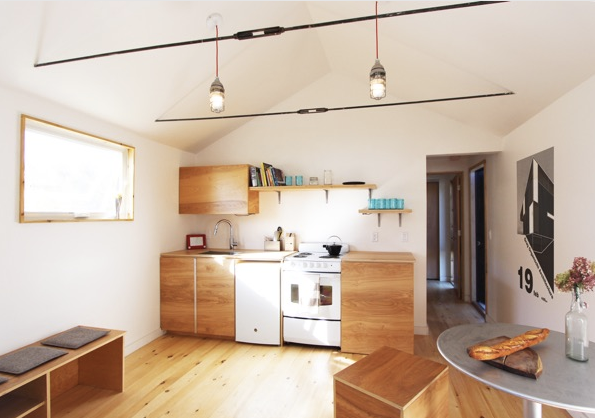Students at Norwich University in Vermont have taken affordable housing into their own hands.
According to Treehugger, they have developed the CASA (Creating Affordable Sustainable Architecture) 802, a 324-square-foot micro home that provides sustainable housing for people from all income levels.

Norwich University Professor Tolya Stonorov informs MHLivingNews, that this particular prototype micro home is built to IBC (International Building Code) standards, and that the school’s focus is on affordable housing for people in Vermont.
“Our next iteration will be even more locally sourced due to our partnership with a local mill. Our aim is not to just build one or two of these. We hope to partner with a manufacturer who could produce these homes that would allow us to reach out to the larger community,” said Stonorov.
“One of the concepts behind our work is you could plug in secondary or tertiary modules as the family grows or the housing situation changes.”
This 13-foot by 10-foot home is more generous in size than the well publicized “tiny homes,” yet smaller than an average manufactured home.

The home features a separate bedroom with storage, a full bathroom and a living space.
It is also wide enough that someone can actually enter into a hall outside the bathroom instead of “falling into the living area.”
The custom design maximizes space, and utilizes local materials, as custom built-in birch plywood furniture for planned storage, seating and workspace. The walls and porch of the home are made from charred local white cedar.

The total cost to design and build the home was $30,000, and students used high quality, formaldehyde free woods, high efficiency windows and a high efficiency heat pump.
That cost, it should be noted, would be quite a bit higher than manufactured homes.
Professor Stonorov also commented on the educational value of the project for students.
“Beyond providing a similar price-point, sustainable and beautiful alternative to the trailer, CASA 802 encourages experiential learning. The academic design-build studio supports the idea that building, making and designing are intrinsic to each other: knowledge of one strengthens and informs the expression of the other,” said Stonorov.
“Hands on learning through the act of building what you design, translates theories and ideas into real world experience. Design-build grounds us in the physicality of the world we live in. Students in the CASA 802 studio gained unique experience through the design and construction of this home.”
For more on the comparisons between “tiny homes” and HUD Code manufactured homes, click here. ##
(Image credits are as shown above.)

Submitted by RC Williams to MHLivingNews.
 manufacturedhomelivingnews.com Manufactured Home Living News
manufacturedhomelivingnews.com Manufactured Home Living News































